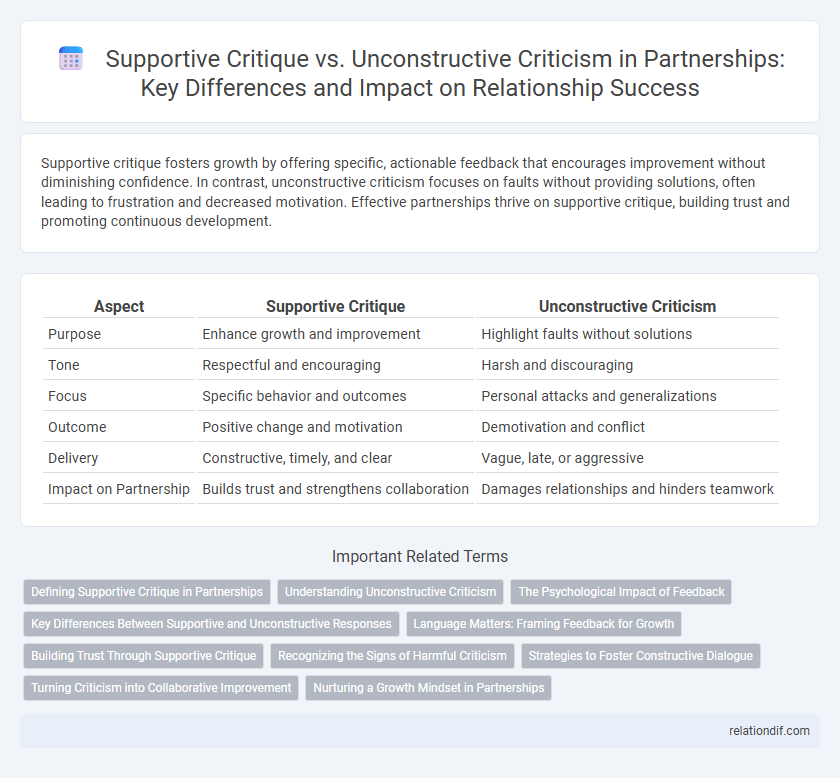Supportive critique fosters growth by offering specific, actionable feedback that encourages improvement without diminishing confidence. In contrast, unconstructive criticism focuses on faults without providing solutions, often leading to frustration and decreased motivation. Effective partnerships thrive on supportive critique, building trust and promoting continuous development.
Table of Comparison
| Aspect | Supportive Critique | Unconstructive Criticism |
|---|---|---|
| Purpose | Enhance growth and improvement | Highlight faults without solutions |
| Tone | Respectful and encouraging | Harsh and discouraging |
| Focus | Specific behavior and outcomes | Personal attacks and generalizations |
| Outcome | Positive change and motivation | Demotivation and conflict |
| Delivery | Constructive, timely, and clear | Vague, late, or aggressive |
| Impact on Partnership | Builds trust and strengthens collaboration | Damages relationships and hinders teamwork |
Defining Supportive Critique in Partnerships
Supportive critique in partnerships involves providing feedback that is specific, actionable, and aimed at mutual growth, fostering trust and collaboration. It emphasizes understanding the partner's perspective and highlighting strengths alongside areas for improvement. This approach strengthens communication and builds a foundation for continuous development within the partnership.
Understanding Unconstructive Criticism
Unconstructive criticism often lacks specific feedback and clear guidance, leading to confusion and frustration in partnerships. It tends to focus on personal faults rather than actionable solutions, diminishing trust and collaboration between partners. Recognizing unconstructive criticism is essential for maintaining effective communication and fostering a positive, growth-oriented partnership environment.
The Psychological Impact of Feedback
Supportive critique fosters psychological safety by encouraging growth and resilience, which enhances collaboration and trust within partnerships. Unconstructive criticism, however, often triggers stress and defensiveness, damaging self-esteem and undermining effective communication. Prioritizing constructive feedback mechanisms can significantly improve mental well-being and partnership outcomes.
Key Differences Between Supportive and Unconstructive Responses
Supportive critique offers specific, actionable feedback aimed at growth, emphasizing strengths while addressing areas for improvement with empathy and respect. Unconstructive criticism, however, tends to be vague, negative, and judgmental, often focusing on faults without offering solutions or encouragement. The key difference lies in the intent and delivery: supportive responses foster collaboration and improvement, whereas unconstructive remarks can damage trust and hinder partnership progress.
Language Matters: Framing Feedback for Growth
Supportive critique uses language that encourages learning and improvement by focusing on specific behaviors and offering actionable suggestions, fostering a growth mindset within the partnership. Unconstructive criticism often employs vague or negative language that can create defensiveness and diminish trust, hindering collaboration. Framing feedback with positive, solution-oriented phrases enhances communication effectiveness and strengthens mutual respect in the partnership.
Building Trust Through Supportive Critique
Supportive critique fosters trust by offering specific, actionable feedback that encourages growth and development, contrasting sharply with unconstructive criticism that often leads to defensiveness and erodes relationships. Emphasizing empathy and understanding, supportive critique strengthens partnerships by promoting open communication and mutual respect. This approach cultivates a collaborative environment where trust becomes the foundation for long-term success and innovation.
Recognizing the Signs of Harmful Criticism
Recognizing the signs of harmful criticism in partnerships involves identifying persistent negative feedback that attacks character rather than addressing specific behaviors or outcomes. Supportive critique focuses on actionable insights and encourages growth, whereas unconstructive criticism often includes vague, personal, or emotionally charged comments that diminish trust and collaboration. Effective partnerships rely on clear boundaries and mutual respect to prevent destructive communication patterns that hinder progress.
Strategies to Foster Constructive Dialogue
Supportive critique prioritizes actionable feedback rooted in specific observations, fostering trust and mutual growth within partnerships. Strategies to encourage constructive dialogue include active listening, framing feedback with empathy, and focusing on shared goals rather than personal shortcomings. Cultivating an environment where open communication is normalized reduces defensiveness and enhances collaborative problem-solving.
Turning Criticism into Collaborative Improvement
Supportive critique in partnerships fosters open communication by highlighting specific areas for growth while maintaining respect and empathy, thereby encouraging mutual trust. Unconstructive criticism, often vague and personal, undermines collaboration and damages relationships. Transforming criticism into collaborative improvement involves framing feedback as opportunities for joint problem-solving and shared goals, enhancing overall partnership effectiveness.
Nurturing a Growth Mindset in Partnerships
Supportive critique in partnerships fosters a growth mindset by emphasizing constructive feedback, encouraging learning, and promoting resilience. It focuses on specific behaviors and solutions, enabling partners to develop skills and improve performance collaboratively. Unconstructive criticism undermines trust and motivation, often leading to defensiveness and stagnation rather than growth.
Supportive Critique vs Unconstructive Criticism Infographic

 relationdif.com
relationdif.com